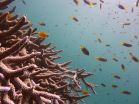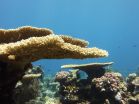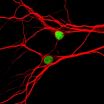(Press-News.org) A glimmer of hope for corals as baby reef builders cope with acidifying oceans
While the threat of coral bleaching as a result of climate change poses a serious risk to the future of coral reefs worldwide, new research has found that some baby corals may be able to cope with the negative effects of ocean acidification.
Ocean acidification, which is a direct consequence of increased atmospheric carbon dioxide levels, is expected to have a deleterious effect on many marine species over the next century.
An international team examining the impact of ocean acidification on coral has found that a key reef building coral can, over a relatively short period of time, acclimate to a doubling of atmospheric carbon dioxide levels.
"Our aim was to explore the effect of a more acidic ocean on every gene in the coral genome," says study lead author, Dr Aurelie Moya, a molecular ecologist with the ARC Centre of Excellence for Coral Reef Studies at James Cook University.
The researchers exposed baby corals from the Great Barrier Reef to acidified seawater for varying lengths of time and investigated how they responded at a molecular level.
"We found that, whereas 3 days of exposure to high CO2 disrupts formation of the coral skeleton, within nine days the baby corals had re-adjusted their gene expression to pre-exposure levels. Longer exposure seems to be less detrimental to coral health than we had assumed based on shorter-term studies," Dr Aurelie Moya says.
"These findings suggest that baby corals have the capacity to acclimate to elevated carbon dioxide."
"We saw that within a few days, juvenile coral adapted to CO2 levels double those experienced today with no obvious disruption to its life processes," says study co-author, Professor David Miller, who leads the molecular biology group in the Coral CoE.
Professor Miller says the findings are particularly significant as they centred on staghorn coral.
"Staghorn corals are the key reef building corals throughout the Pacific and Indian oceans. These are traditionally considered to have poor stress tolerance. So this work provides a glimmer of hope that coral reefs can attenuate the effects of ocean acidification."
The research team examined tens of thousands of coral genes and was able to identify those that were responsible for enabling acclimation to high carbon dioxide.
Dr Moya says the study is an essential first step to better understand how reef building corals adapt to environmental stress.
However, both Dr Moya and Professor Miller remain cautious about the ability of corals to tolerate the combination of increased carbon dioxide and climate change.
"This study focused on one single stressor, ocean acidification, but we must keep in mind that the combination of several stressors, such as ocean acidification and warming could lead to larger impacts on baby corals," Dr Moya says.
"The next step is to investigate the effect of combined stressors on corals' gene expression."
INFORMATION:
Paper:
Rapid acclimation of juvenile corals to CO2-mediated acidification by up-regulation of HSP and Bcl-2 genes by Aurelie Moya, Lotte Huisman, Sylvain Foret, Jean-Pierre Gattuso, David Hayward, Eldon Ball and David Miller is published in the journal, Molecular Ecology.
http://onlinelibrary.wiley.com/doi/10.1111/mec.13021/abstract
Images:
Corals - image credit: Aurelie Moya
Contacts:
Dr Aurelie Moya - +61 (0) 7 4781 3654
aurelie.moya@jcu.edu.au
Professor David Miller - +61 (0) 419 671 768
david.miller@jcu.edu.au
Eleanor Gregory, Coral CoE Communications Manager - +61 (0) 428 785 895
eleanor.gregory@jcu.edu.au
INFORMATION:
Coral reefs provide a range of benefits, such as food, opportunities for income and education, but not everyone has the same access to them, according to a new study conducted by the ARC Centre of Excellence for Coral Reef Studies (Coral CoE) at James Cook University.
The researchers examined how people from 28 fishing communities in Madagascar, Kenya, Tanzania and Seychelles benefit from the marine environment.
For many years conservation in developing countries has been based on the assumption that improvements in ecosystem conditions, such as increasing coral reef ...
December 3, 2014 -- Individuals conceived in the severe Dutch Famine, also called the Hunger Winter, may have adjusted to this horrendous period of World War II by making adaptations to how active their DNA is. Genes involved in growth and development were differentially regulated, according to researchers at the Leiden University Medical Center, Harvard University, and Columbia University's Mailman School of Public Health. Findings are published in the journal Nature Communications.
During the winter of 1944-1945 the Western part of The Netherlands was struck by a severe ...
CHAPEL HILL, NC - UNC School of Medicine researchers have found for the first time a biochemical mechanism that could be a cause of "chemo brain" - the neurological side effects such as memory loss, confusion, difficulty thinking, and trouble concentrating that many cancer patients experience while on chemotherapy to treat tumors in other parts of the body.
The research, published in the Proceedings of the National Academy of Sciences, shows how the common chemotherapy drug topotecan can drastically suppress the expression of Topoisomerase-1, a gene that triggers the ...
Coffee, apple juice, and vitamin C: things that people ingest every day are experimental material for chemist Eva-Maria Felix. The doctoral student in the research group of Professor Wolfgang Ensinger in the Department of Material Analysis is working on making nanotubes of gold. She precipitates the precious metal from an aqueous solution onto a pretreated film with many tiny channels. The metal on the walls of the channels adopts the shape of nanotubes; the film is then dissolved. The technique itself is not new, but Felix has modified it: "The chemicals that are usually ...
WASHINGTON, D.C., December 3, 2014--A new report from the American Institute of Physics (AIP) Statistical Research Center has found that the number of Hispanic students receiving bachelor's degrees in the physical sciences and engineering has increased over the last decade or so, passing 10,000 degrees per year for the first time in 2012. The overall number of U.S. students receiving degrees in those fields also increased over the same time, but it increased faster among Hispanics.
From 2002 to 2012, the number of Hispanics earning bachelor's degrees in the physical sciences ...
TALLAHASSEE, Fla. -- A team led by Florida State University researchers has identified DNA elements in maize that could affect the expression of hundreds or thousands of genes.
"Maybe they are part of the machinery that allows an organism to turn hundreds of genes off or on," said Associate Professor of Biological Science Hank Bass.
Bass and Carson Andorf, a doctoral student in computer science at Iowa State University, began this exploration of the maize genome sequence along with colleagues from FSU, Iowa State and the University of Florida. They wanted to know ...
New York, NY, December 2, 2014 - Immediate breast reconstruction following mastectomy is becoming more prevalent. However, in breast cancer patients undergoing simultaneous chemotherapy, thrombotic complications can arise that can delay or significantly modify reconstructive plans. Outcomes of cases illustrating potential complications are published in the current issue of Annals of Medicine and Surgery.
Chemotherapy is increasingly used to treat larger operable or advanced breast cancer prior to surgery. Chemotherapy delivered via the placement of a central venous line ...
Hamilton, ON (Dec. 3, 2014) - Scientists at McMaster University have discovered that human stem cells made from adult donor cells "remember" where they came from and that's what they prefer to become again.
This means the type of cell obtained from an individual patient to make pluripotent stem cells, determines what can be best done with them. For example, to repair the lung of a patient with lung disease, it is best to start off with a lung cell to make the therapeutic stem cells to treat the disease, or a breast cell for the regeneration of tissue for breast cancer ...
CAMBRIDGE, MA -- MIT biological engineers have created a new computer model that allows them to design the most complex three-dimensional DNA shapes ever produced, including rings, bowls, and geometric structures such as icosahedrons that resemble viral particles.
This design program could allow researchers to build DNA scaffolds to anchor arrays of proteins and light-sensitive molecules called chromophores that mimic the photosynthetic proteins found in plant cells, or to create new delivery vehicles for drugs or RNA therapies, says Mark Bathe, an associate professor ...
Vienna, Austria - 3 December 2014: The Mediterranean diet is linked to improved cardiovascular performance in patients with erectile dysfunction, according to research presented at EuroEcho-Imaging 2014 by Dr Athanasios Angelis from Greece. Patients with erectile dysfunction who had poor adherence to the Mediterranean diet had more vascular and cardiac damage.
EuroEcho-Imaging is the annual meeting of the European Association of Cardiovascular Imaging (EACVI), a branch of the European Society of Cardiology (ESC), and is held 3-6 December in Vienna, Austria.
Dr Angelis ...




